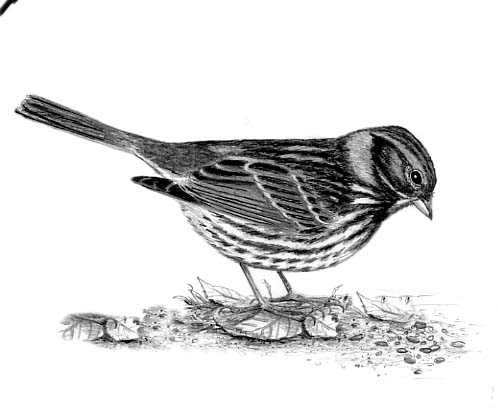
Dear Bird Folks,
This past fall I had a Fox Sparrow feeding under my feeder. I haven’t seen them around for years. Where have they been and do you think they will return next fall? Also, I’ve noticed that many of your questions come from off Cape places. Is this column syndicated?
-John, Harwich, MA
I wish John,
It would be nice to be sitting in a penthouse in some major city, dictating bird answers to a team of secretaries. But nope, this column is not syndicated. It is written right here in Orleans, MA. Couldn’t you tell from my accent? Even though Ask the Bird Folks isn’t syndicated, Cape Cod certainly is. I don’t have to tell you that people come from all over to visit the Cape, either as second home owners or vacationers. Many of these people have the Cape’s local newspapers delivered to them at their off Cape addresses. While they are away from us, they like to keep informed as to which canal bridge will be shut down during which busy weekend or whether Lyme Disease, West Nile or coyotes, will be the hysteria in vogue on any particular week. It is these out-of-town Cape Codders who are writing in with bird questions. You locals can come in and ask me in person. Talk about lucky.
Another source of questions comes from the internet. Askthebirdfolks.com archives all the columns that we’ve written, or at least the ones we haven’t lost. Which means right now some guy in some faraway place like Borneo could be reading about your Fox Sparrows and be thinking, “Man, that Cape Cod is one scary place. They have sparrows the size of foxes.” Borneoians are known for there imagination.
The Fox Sparrow gets its name from its distinctive markings. The “fox” refers to the bird’s rufous coloring and not to the females being alluring and seductive or to the males watching a particular cable channel that often distorts the news. It was a good fall for Fox Sparrow sightings. We had quite a few reports. We even had one feeding under the feeder at our store. Fox Sparrows are not local nesters, so we only see them on spring and fall migration, with a few spending the winter. Unlike many birds, whose migration is predictable, our Fox Sparrow visits can be a bit erratic. Some years we see more than others. Good for you for paying attention John. Most people would just think “there’s another brown bird” and go back to watching the “Price is Right.”
A Fox Sparrow is not your basic dull sparrow. In addition to their standout rufous coloring, they are larger and more robust than the average sparrow, looking like a sparrow that spends long hours in the gym. Also, their feeding behavior sets them apart from the others. Fox sparrows don’t pick around on the ground while they search for food. They dig at the ground by kicking with both feet at the same time, like a towhee or a guy in a potato sack race.
Because of their need to dig, you probably won’t find a Fox Sparrow on your feeder, but on the ground eating underneath it. Also, they are one of those rare feeder birds that don’t care about sunflower seeds. They would much rather eat the little millet seeds that many companies add to water down those awful seed mixes.
As you mentioned earlier John, other people, besides us Cape Codders, may be reading this column and wondering why their Fox Sparrows don’t have all this rufous color that I have been referring to. Fox Sparrows are one of those clever birds that have a different look, depending on which part of the continent they are from. In fact, the Fox Sparrows that live along the West coast are a dark brown, with very little rufous at all. Having an assortment of plumages is something that some sparrows like to do just to play with the heads of bird watchers.
Even though Fox Sparrows are a fairly large sparrow, they aren’t as hardy as say the smaller and more familiar Song Sparrow. Cape Cod is the northernmost part of the Fox Sparrow’s winter range. A few may be found here in the winter, but the majority of the Fox Sparrows will be found scratching up the ground further south. They’ll stay there until the end of March, at which time they will start the long trip back to their breeding grounds in northern Canada. It is on this return trip that you’ll have the best chance of seeing your Fox Sparrows again.
Thanks for the question John. If I ever become syndicated I promise I’ll invite you up to my penthouse. Although with my luck the penthouse will probably be someplace in Borneo.